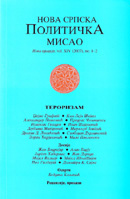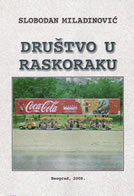|
 As I watched rioters attacking the U.S. Embassy in Belgrade and burning the flag hanging from its balcony, I remembered raising that same flag a little over seven years ago as we re-established the diplomatic relations broken during the Milosevic regime. As I watched rioters attacking the U.S. Embassy in Belgrade and burning the flag hanging from its balcony, I remembered raising that same flag a little over seven years ago as we re-established the diplomatic relations broken during the Milosevic regime.
In fact, as I write this column, I am staring at a "mouse pad" for my computer that we sent out by the hundreds with exactly that flag-waving image. It was a time of hope and optimism. I thought of all the work done by so many Serbs, beginning with Zoran Djindjić, to re-connect Serbia with Europe and to lead the country and its citizens to a better life. And it seemed to me that all of this effort was literally going up in smoke.
It was always clear that one of the major casualties of Kosovo Independence would be the bilateral relationship between the United States and Serbia . The United States of America was the driving force behind the initial NATO bombing campaign in 1999 and now the coordinated recognition of the Unilateral Declaration of Independence by the Kosovo Albanians.
But more that that, both the tone and content of the continuous public statements made by senior American officials in support of that independence even touched a nerve in many Serbs who were strong supporters of a democratic, pro-European policy. Most Serbs cannot understand why this is happening now, so long after the fall of Milosevic, when the succeeding governments have done so much to move Serbia in the right direction.
The fundamental problem, however, is that the post-Milosevic relationship between the two countries has been based on a foundation of sand. The United States erroneously interpreted the fall of Milosevic as a total repudiation by the Serbian people of his policies. It assumed this meant that a majority of the Serbian people, therefore, subscribed to the American view of Balkan history. Nothing could be further from the truth.
-Almost the whole foreign policy establishment (in government, Congress and the private sector) in the United States sees the Kosovo Albanians as having been treated for decades as second-class citizens, increasingly persecuted by the Milosevic regime. It sees the rise of the Kosovo Liberation Army, after years of non-violent protest led by Ibrahim Rugova, as an inevitable consequence of Serbian human rights abuses.
It views the Serbian military and police response to the KLA to be massive, indiscriminant overkill. The CNN images of hundreds of thousands of fleeing Kosovo Albanians arriving in hastily erected refugee camps in Macedonia , Albania , and Montenegro was the "final straw" which sealed American opinion that independence for Kosovo for the only answer.
The Serbs view Kosovo as the cradle of their civilization, which has been stolen from them through a combination of the abuse of international power and clever Kosovo Albanian distortions. They see the Kosovo Serb refugees in their midst and view them and the Serbian people as a whole as the true victims.
They cite the numerous human rights abuses, including murder, destruction of churches, ethnic cleansing, and kidnapping by the Kosovo Albanians against the Serbs in the aftermath of the NATO bombing campaign and wonder why it was allowed to occur and why nothing has yet been done to bring the perpetrators to justice. They despise the Kosovo Albanians as criminals, actual terrorists or supporters of terrorism, and treacherous ingrates.
-The same U.S. foreign policy establishment views Slobodan Milosevic and the extremist Serbs he encouraged and supported as the major incendiary factor leading to the violent breakup of the former Yugoslavia . It supports strongly the International Criminal Tribunal for the former Yugoslavia and wants all the indicted war criminals, particularly Mladic and Karadzic, to be brought to The Hague.
It has no sympathy for ethnic Serb efforts in Bosnia and Croatia to set up "independent" entities, believing that this was the beginning of "ethnic cleansing" during those conflicts. It finds incomprehensible that individuals such as Arkan were treated in Serbia as national heroes.
The Serbian people remember that Abraham Lincoln was considered one of our greatest Presidents in large part because he fought a bloody Civil War to keep the United States together against the wishes of many states determined to secede. They feel that the Serbs were the principal victims of the breakup of Yugoslavia and that they were provoked by other ethnic groups into establishing their breakaway regions. Crimes against Serbs were consistently ignored in their view, while crimes committed by Serbs were exaggerated. The ICTY is seen as a deeply flawed and politicized body consistently prejudiced against the Serbs.
Zoran Djindjic and other democratic political leaders were well aware of the gap between these viewpoints. They wanted to keep focused on the future. The problem, however, was that the past in the Balkans kept intruding on both the present and the future. Prime Minister Djindjic faced a Red Beret revolt an d ultimately was killed at least in large part because he tried to satisfy Western demands to turn Serbian war crimes indictees over to The Hague. This issue, plus Kosovo, has significantly strengthened - and emboldened - extremist, nationalistic forces in Serbia .
In sum, the era of good feeling ushered in by the fall of the Milosevic government was probably doomed to fail. It is hard to see when or how this downward spiral will end or be reversed. The situation will get far worse before it gets better. Many say that the anti-American atmosphere in Serbia today is even worse than during the Kosovo bombing campaign. At least at that time, the Serbs could partially blame Milosevic.The pity is that there are a great many Serbs, probably a majority, who are watching this exercise in deja vu with a mixture of despair and frustration.
But at least as of this moment, there is no one speaking for them. The political figures of moderation are conspicuous by their silence and ineffectual approach. Nationalist forces, willing and seemingly eager to forsake the European path for proud isolation (and condemning the Serbian people to a second class status in Europe) are in the ascendancy. The West takes no joy in this development, but what it should take is its fair share of the responsibility for bringing it about. 2 March 2008 |




.jpg)








 As I watched rioters attacking the U.S. Embassy in Belgrade and burning the flag hanging from its balcony, I remembered raising that same flag a little over seven years ago as we re-established the diplomatic relations broken during the Milosevic regime.
As I watched rioters attacking the U.S. Embassy in Belgrade and burning the flag hanging from its balcony, I remembered raising that same flag a little over seven years ago as we re-established the diplomatic relations broken during the Milosevic regime. 











